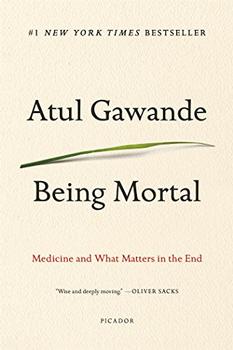Write your own review!
Peggy
Warning: Aging-Approach with Caution!
This book adds greatly to the conversation of aging, death, and quality of life issues. It goes further than most by flipping the discussion on its head by not defining a "good death" but rather the a "good life". One should always strive to define for themselves what they want to do-- not allowing the medical establishment to try to prolong life as long as it can. Autonomy, dignity, and personal choice can only be decided by the individual. Sometimes families lovingly get in the way of the dying.
My only criticism is that Dr Gawande's sharing of many anecdotal stories became somewhat redundant. His account of his fathers' death, however, was very moving! The book needed tighter editing in my opinion. Overall, I highly recommend. His list of source material is extensive and provides further investigation for those interested.
Dot
What you should know as you age
Well written, author provides insight to the issues of people as they age and the things they need to consider as they age. A must for Boomers and their family.
Gloria
Recommended reading
Atul Gawande's "Being Mortal" actually made me feel better about growing older and, eventually, frailer. Just knowing that there are people like him that are trying to make longer lives better lives gives me great comfort. This book should be in every home. And now I want to read his other books, too.
Nancy
Palliative Care
This should be required reading for anyone over 30.....what Gwande has to say is important.....we are all mortal and at some point the effort to cure should be replaced with the effort to provide humane support and freedom from pain....to end our lives with dignity and peace....the medical profession and family members need to understand that treatments which prolong life at all costs ,no matter how well intended,only prolong pain and suffering.....professional hubris and selfish justification need to give way to a more humane acceptance of reality .....and certainly Hospice is one option for doing just that....clearly written with reason and compassion this book is a definitive argument for a realistic approach to illness and death.
 Cloggie Downunder
Recommended
Cloggie Downunder
Recommended
Being Mortal is the fourth book by American surgeon and author, Atul Gawande. Early on in his book, he tells us :“…the purpose of medical schooling was to teach how to save lives, not how to tend to their demise” and that “I knew theoretically that my patients could die, of course, but every actual instance seemed like a violation, as if the rules I thought we were playing by were broken. I don’t know what game I thought this was, but in it we always won”.
But don’t get the wrong idea: this is not a book about dying, so much, as a book that looks at how the latter hours, days, weeks, months or even years of life can be improved. As we get older, and usually frailer (because there is no “…automatic defrailer…” p44 available to us), we need to rethink where the emphasis should lie: “…our most cruel failure in how we treat the sick and the aged is the failure to recognise that they have priorities beyond merely being safe and living longer…”
“We end up with institutions that address any number of societal goals – from freeing up hospital beds to taking burdens off families’ hands to coping with poverty among the elderly – but never the goal that matters to the people who reside in them: how to make life worth living when we’re weak and frail and can’t fend for ourselves”. Gawande’s wife’s grandmother, when institutionalised, remarked: “She felt incarcerated, like she was in prison for being old”
Gawande backs up his ideas with plenty of data that is both fascinating and revealing. And while an information dump could be boring, he illustrates all this with the results of studies and anecdotes about real people. It doesn’t get much more personal than the experience of his own father’s decline.
“Our responsibility, in medicine, is to deal with human beings as they are. People die only once. They have no experience to draw on. They need doctors and nurses who are willing to have the hard discussions and say what they have seen, who will help people prepare for what is to come…”
While many practitioners of palliative care will be familiar with what Gawande says, this book should be compulsory reading for most health care professionals. Oncologists, gerontologists, surgeons and intensivists (and their patients!) in particular would benefit from reading this book from cover to cover; those of us with ageing or debilitated family members, or those wanting to plan for their own eventual decline, would also find this book interesting and useful.
He concludes: “We’ve been wrong about what our job is in medicine. We think our job is to ensure health and survival. But really it is larger than that. It is to enable well-being. And well-being is about the reasons one wishes to be alive. Those reasons matter not just at the end of life, or when debility comes, but all along the way. Whenever serious sickness or injury strikes and your body or mind breaks down, the vital questions are the same: What is your understanding of the situation and its potential outcomes? What are your fears and what are your hopes? What are the trade-offs you are willing to make and not willing to make? And what is the course of action that best serves this understanding?” Recommended.

 Book Reviewed by:
Book Reviewed by:



